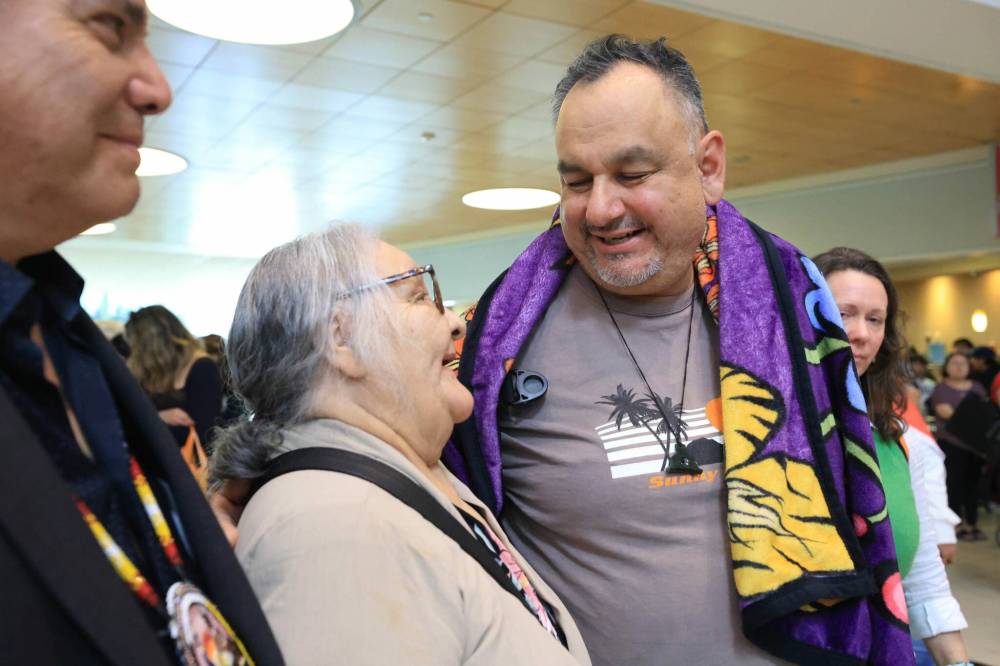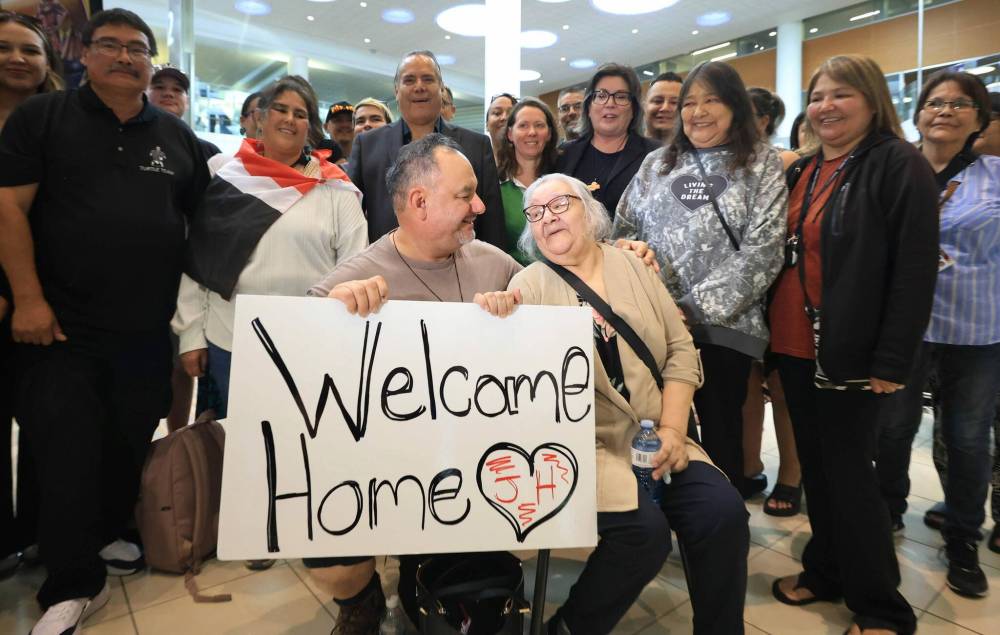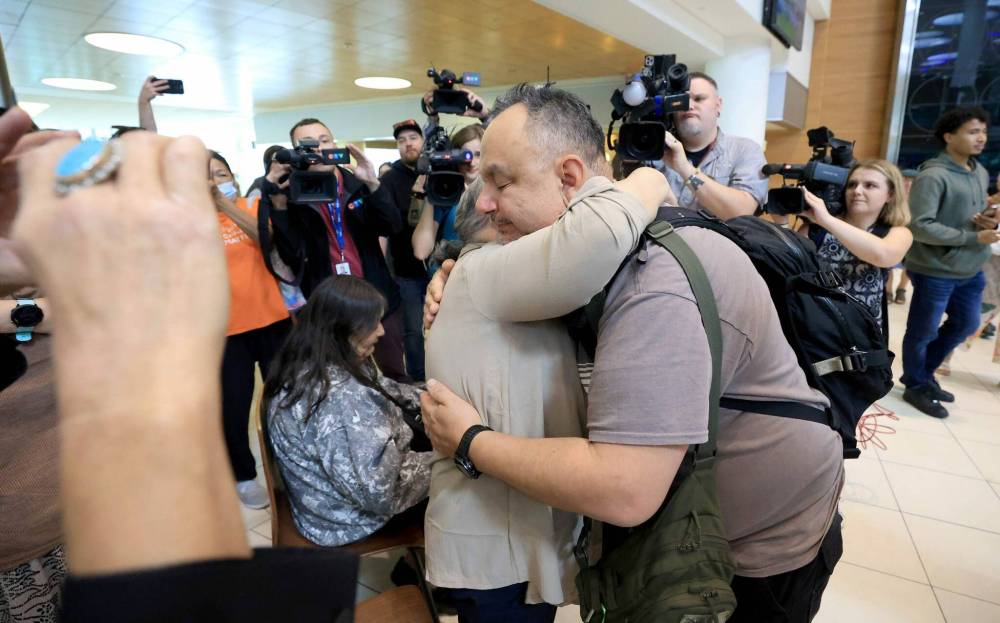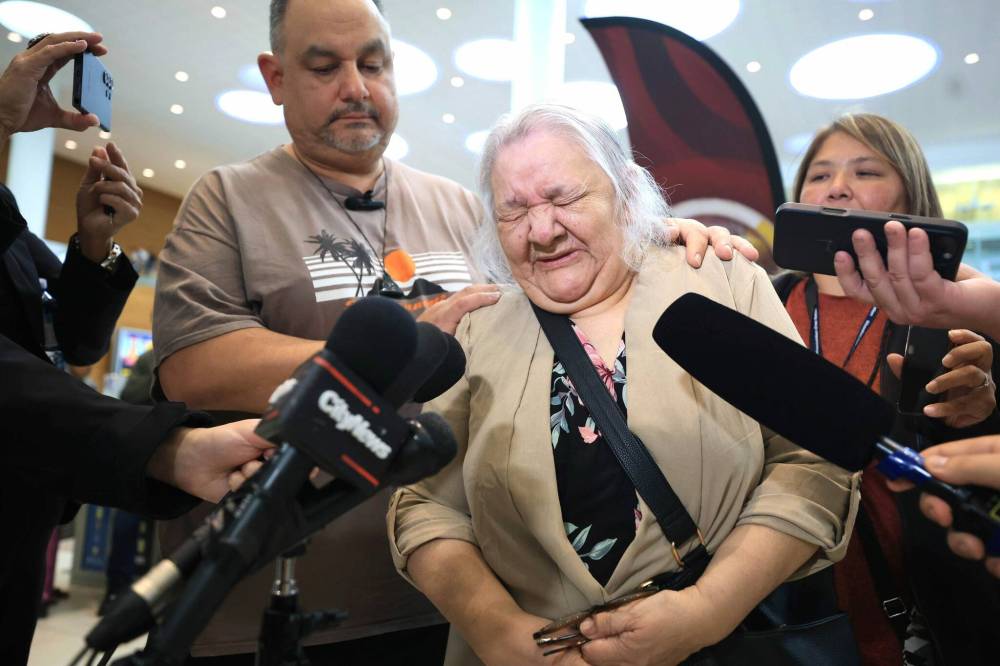‘So happy’: mother-son reunion half a century in the making
’60s Scoop survivor, who moved overseas when he was a toddler, ‘overwhelmed’ at meeting birth mom in Winnipeg
Advertisement
Read this article for free:
or
Already have an account? Log in here »
To continue reading, please subscribe:
Monthly Digital Subscription
$0 for the first 4 weeks*
- Enjoy unlimited reading on winnipegfreepress.com
- Read the E-Edition, our digital replica newspaper
- Access News Break, our award-winning app
- Play interactive puzzles
*No charge for 4 weeks then price increases to the regular rate of $19.00 plus GST every four weeks. Offer available to new and qualified returning subscribers only. Cancel any time.
Monthly Digital Subscription
$4.75/week*
- Enjoy unlimited reading on winnipegfreepress.com
- Read the E-Edition, our digital replica newspaper
- Access News Break, our award-winning app
- Play interactive puzzles
*Billed as $19 plus GST every four weeks. Cancel any time.
To continue reading, please subscribe:
Add Free Press access to your Brandon Sun subscription for only an additional
$1 for the first 4 weeks*
*Your next subscription payment will increase by $1.00 and you will be charged $16.99 plus GST for four weeks. After four weeks, your payment will increase to $23.99 plus GST every four weeks.
Read unlimited articles for free today:
or
Already have an account? Log in here »
After more than 50 years, a long-separated mother and son finally embraced in Winnipeg on Wednesday, their reunion a powerful reminder of the lasting scars of the ’60s Scoop.
Tears flowed as Jonathan Hooker stepped off a flight and into the arms of his birth mother, Patsy George, at Winnipeg Richardson International Airport.
It was the first time the two had seen each other since he was taken from her as a baby.

RUTH BONNEVILLE / FREE PRESS
Jonathan Hooker meets his biological mother, Patsy George, for the first time since 1975 after flying from New Zealand to Winnipeg with his wife.
Hooker was six months old when he was taken from his family in the northern Manitoba community of Moose Lake in 1975. On Wednesday, the 52-year-old stepped off a flight from Vancouver, arriving with his wife, Charmaine, after travelling from New Zealand.
“It was just cool to meet her, a little bit overwhelmed really,” Hooker said in a thick Kiwi accent. “That was the first time I laid eyes on her.”
George struggled to contain her emotions after seeing her son for the first time in 51 years.
“I was so scared (to meet him), and then after a while, I was so happy. We started talking,” said George, who stopped several times to fight away tears. “I hope he comes back to Canada to stay. Permanently.”
Hooker is among an estimated 20,000 Indigenous children taken from their families during the ’60s Scoop, a four-decade span between 1951 and 1991, when First Nations, Métis and Inuit children were placed with non-Indigenous foster or adoptive parents, severing them from their cultures and communities.
Adopted by a white middle-class family in Manitoba, Hooker was moved overseas at 18 months old.

RUTH BONNEVILLE / FREE PRESS
Patsy George and family at the James Richardson Winnipeg International Airport on Wednesday await the arrival of her son Jonathan Hooker, who was taken from her when he was six months old.
“I didn’t really know anything about the ’60s Scoop until about five years ago, and then I learned in just the last year or so how it really played out,” he said.
Hooker credits his adoptive parents for being open about his adoption and for sharing information that eventually helped him trace his steps back to Manitoba.
“It’s been a journey,” Hooker said.
Indigenous leaders and community members, including drummers, greeted Hooker with a welcoming song. He plans to stay in Manitoba for three weeks, taking part in cultural events, including a sweat lodge and a naming ceremony, and travelling to his home community of Moose Lake First Nation next week.
Manitoba Keewatinowi Okimakanak Grand Chief Garrison Settee, who was among those present, called the reunion “powerful.” MKO, along with Anish Healing Centre and the Southern Chiefs’ Organization, helped fund Hooker’s trip.
“This is a moment to celebrate, that there is hope for a lot of people all over the world that are searching for their families,” he said. “This is a miracle that is happening right before our eyes. Everybody in this place felt the power of that reunion, and we need to let it happen over and over again.”

RUTH BONNEVILLE / FREE PRESS
Jonathan Hooker shares a hug with his biological mother, Patsy George. Hooker is among an estimated 20,000 Indigenous children taken from their families during the ’60s Scoop,
This wasn’t Hooker’s first time back in Canada. He visited as a child and again as an adult, but efforts to find his mother then were unsuccessful.
His sister — also taken in the ’60s Scoop and adopted by a family in Texas — was located last year through DNA testing encouraged by Hooker’s mother-in-law. He travelled to the U.S. last summer to meet her.
Members of advocacy group 60s Scoop Manitoba Region Inc., asked why there isn’t more help from government authorities to bring back survivors who have ended up all over the world.
“We never asked to be placed outside our country or province. Why should survivors foot the bill to come back home?” said Lorraine Sinclair, a ‘60s Scoop survivor and advocate.
In the 1990s, Manitoba operated a repatriation program, but it was later dismantled. Sinclair called on provincial and federal governments to reinstate it.
She recently found her own biological sister, who was adopted to Minnesota, but said the costs of bringing her back are overwhelming.

RUTH BONNEVILLE / FREE PRESS
Patsy George cries while speaking to the media after meeting her son for the first time since 1975.
“It’s one thing to find your family, but there are a lot of costs to truly repatriate someone back to another country,” Sinclair said. “Housing, supports and establishing Canadian citizenship are just a few things that we are dealing with.”
scott.billeck@freepress.mb.ca

Scott Billeck is a general assignment reporter for the Free Press. A Creative Communications graduate from Red River College, Scott has more than a decade’s worth of experience covering hockey, football and global pandemics. He joined the Free Press in 2024. Read more about Scott.
Every piece of reporting Scott produces is reviewed by an editing team before it is posted online or published in print — part of the Free Press‘s tradition, since 1872, of producing reliable independent journalism. Read more about Free Press’s history and mandate, and learn how our newsroom operates.
Our newsroom depends on a growing audience of readers to power our journalism. If you are not a paid reader, please consider becoming a subscriber.
Our newsroom depends on its audience of readers to power our journalism. Thank you for your support.
History
Updated on Wednesday, August 27, 2025 8:55 PM CDT: corrects to 20,000 children

